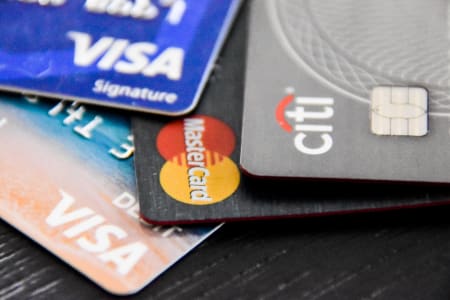
In April 2017 I took my head out of the sand and faced my debt and emotional spending problem. I added up my four different credit card balances and worked out that I owed £16,000. A scarily high amount of debt! I had no immediate way of repaying the debt quickly.
My blog and social media business was doing okay, just about well enough to cover slightly more than minimum monthly repayments of £250. This would mean it would take 64 months, or just over five years, to repay the debt. This felt awful, too long. A sobering and depressing thought.
I came up with a plan and set my mind to paying the debt off as quickly as possible. It took two long years, but I did it! By April 2019 I was credit card debt free.
The best news folks..I am officially credit card debt FREE - 16k in two years - done….#debtfree #debtfreejourney https://t.co/0k45AIIlVR
— Mrs Mummypenny🌈 (@MrsMummypennyUK) May 1, 2019
15 tips to pay off your credit card debt as quickly as possible
- The first step is the hardest and the most important. You need to admit that you have a debt/spending problem and that you want to make a change. Face your fears and add up your debts. Find copies of your latest paperwork or give the card and loan companies a call for balances, interest rates or interest-free time frames.
Getting out of debt: get organised and use the Snowball System with @warrenschutecfp https://t.co/pR2XhlyZJS
— Mrs Mummypenny🌈 (@MrsMummypennyUK) February 27, 2019
If your debt is unmanageable or interest payments are too high and you can’t afford the minimum monthly repayment, seek help now from a free organisation such as Step Change, Christians Against Poverty or Citizens Advice.
Restructure your debt if your credit rating allows. Check your rating for free with Noddle/Credit Karma. Move any high interest rate debt to a 0% deal. Regular credit card interest rate levels are around 18-20%. For every £1,000 you owe, the interest charges will be £180 to £200 PER YEAR. Do what you can to minimise the interest payments.
Money Saving Expert (MSE) has a brilliant up to date tool to help you find the best credit card deals, based on your credit rating. It will be difficult to switch to 0% deal if your credit rating is not good, but MSE can help with this as well with their credit card eligibility checker.
Focus on your monthly spending budget. List everything you spend – from regular bills to cash purchases – onto paper or a spreadsheet or use a phone app to analyse your spending patterns. Choose whatever method you are comfortable with.
Optimise every Direct Debit and monthly bill. Get the best deals for your mortgage, energy, broadband, mobile phone and TV package. Cancel all non-essential Direct Debits such as Netflix, charity donations and children’s savings contributions.
Where i'm saving money this week by switching mortgage, energy, Sky TV & contact lenses. https://t.co/TDCUH3pDoE
— Mrs Mummypenny🌈 (@MrsMummypennyUK) March 10, 2019
Switch where you do your grocery shop. Whichever supermarket you choose, the food should be great quality and if you avoid the bigger chains, you can find amazing prices. And because the shops are smaller you get your shopping done quicker!
Another savings strategy you could consider is having a no-spend month. Only regular bills, groceries and commuting to work are allowed. You can’t spend on anything else, so no coffees, lunches, drinks out, cinema trips, etc.
Stop the takeaways or make them a treat purchase every two weeks or once a month. Home-cook instead and experiment with fake-aways.
Pressure Cooker Bolognese - A great tasting and value for money recipe - https://t.co/xp4hGxLhX7 A fab pressure cooker bolognese recipe pic.twitter.com/sMl7pOrsWE
— Mrs Mummypenny🌈 (@MrsMummypennyUK) June 13, 2018
- Do a no make-up spend year or a no-clothes buying year. Instead re-use all the stuff you already have at home. Or why not mend things that have holes or have ripped? Go all 1970s and put a patch over a hole rather than throwing something out!
- Increase your income with side hustles. Get a second job in the evenings such as cleaning, bar work, dog walking or crafting. Sell any clutter from your home that you don’t use on eBay or Facebook. Or try a car-boot sale. Give mystery shopping a try, a personal favourite of mine that earns me an extra £50 per month.
How to Make Money on eBay - Follow these simple tips - https://t.co/hvnMry5Jal
— Mrs Mummypenny🌈 (@MrsMummypennyUK) February 3, 2019
Come up with a goal of when you want to pay off the debt. Be that two years, three years or five years. And be realistic with that goal and monthly repayments. But also challenge yourself. The quicker you pay off the debt, the sooner you will be free.
Just go for it. Set up a monthly repayment Direct Debit amount that you can afford, just try to make it more than the minimum payment.
Whenever you earn or save extra money it should go into the debt repayment. Pay off the debt with an interest charge first. Even if it’s only an extra £10 earned that month, pay it into the debt.
At the same time as paying off the debt also save into an emergency fund. I did 50/50 payments until my emergency pot reached around £3,000, a number that I felt comfortable with and gave me peace of mind. Then you dip into this for real emergencies, not the credit cards. An emergency being if something breaks (washing machine, car, dishwasher) not if you fancy a holiday.
Want to know what money advice I would give to my 18 yr old self.. https://t.co/Ii6usipqrF
— Mrs Mummypenny🌈 (@MrsMummypennyUK) February 18, 2019
- One day in the future you will be debt free. Be prepared for the ups and downs, and for it being tough on your mental health. Accept that you’ll miss out on things like holidays with your friends or family. But it’s worth it in the long run to be free of debt. The feeling is incredible, I promise you.
Lynn Beattie is a PensionBee customer and CEO/Founder of Mrs Mummypenny, a personal finance website. She is also an ACMA management Accountant, previously working in commercial finance for Tesco, EE & HSBC. Lynn is a single mum to three boys, living in Hertfordshire, and is the author of ‘The Money Guide to Transform Your Life‘ published in September 2020.




